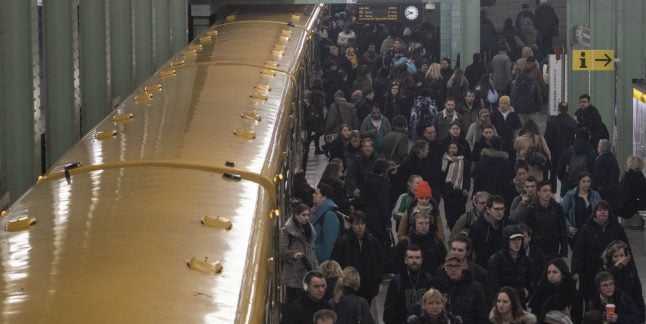Trade union Verdi had called earlier this week for bus drivers at Berlin's public transport operator, the Berliner Verkehrsbetriebe (BVG), to down their tools and walk out as part of a so-called ‘warning strike'.
SEE ALSO: Passengers face disruption as bus drivers in Berlin set to strike
The industrial action started at around 3.30am and was due to last until 10pm. The strike is being held to put pressure on BVG in the current wage negotiations between employers and the union.
Verdi announced that no buses operated by BVG were in operation on Thursday, signalling that the strike was strong.
“The goal is to use this warning strike to increase the pressure on employers in the current negotiations,” Verdi negotiator Jeremy Arndt said.
BVG is the largest municipal transport company in Germany and, with more than 2.9 million customer trips per day, it's the backbone of Berlin's local public transport system.
As we learned, there will be a strike against the BVG by the Verdi union on the 14 March. According to the union’s announcement, the BVG’s bus traffic will be striked against on Thursday from the beginning of operations in the morning (ca 3:30 AM) until 10 PM. #BVG @berlinairport pic.twitter.com/dPOHgGOPE9
— BVG Bus (@BVG_Bus) March 13, 2019
If you’re travelling in the capital, here's how the strike might affect you, and details of the other services you can use instead of buses.
SEE ALSO: Public service strikes continue as Potsdam talks fail
S-Bahn and regional trains
S-Bahn and regional trains will run this Thursday according to the timetable. These trains are not operated by the BVG, but by Deutsche Bahn and other companies.
Rail replacement services (SEV) on these lines will not be affected. “The S-Bahn does not use BVG buses for replacement transport, it is not affected”, said S-Bahn spokeswoman Sandra Spieker, reported the Berliner Zeitung.
 Information sign shows that a bus strike is ongoing. Photo: DPA
Information sign shows that a bus strike is ongoing. Photo: DPA
U-Bahn and trams
Unlike the strike that took place in February, on Thursday underground trains (U-Bahn) and trams will not be affected. But services are much busier than usual as many people have switched to these modes of transport.
However, replacement services that use buses are affected. The replacement service for the M4 and M13 tram lines will also be on strike, BVG's Jannes Schwentu told the Berliner Zeitung.
It is also expected that replacement services for the underground lines U1, U8 and U9 will start later in the evening. Normally they start at 10 or 11pm, but at the beginning there may be some restrictions.
Private bus companies
The BVG buses will remain off the roads on Thursday. The warning strike lasts until 10 pm, after which it may take some time for all buses to operate normally.
SEE ALSO: IN PICTURES: Berlin public transport strike ends but more disruption expected
Only the routes used by BVG contractors are in operation throughout the day. These are routes 106, 161, 162, 163, 168, 175, 179, 218, 234, 263, 275, 284, 320, 322, 334, 341, 349, 363, 365, 371, 373, 380, 390 and 399.
The following routes operate with slight restrictions: 112, 140, 184, 283, 370 and 893. These routes are operated by private bus companies commissioned by the BVG. These companies are not affected by the tariff dispute.
Emergency shuttle service to Tegel airport
There will be a bus shuttle to Tegel Airport – this time from Jakob-Kaiser-Platz underground station, not from Jungfernheide station as was the case with the first strike in February.
Aufgrund eines #Streiks der #BVG kommt es am Donnerstag zu starken Einschränkungen bei der An-und Abreise insbesondere am Flughafen #TXL. Bitte plant mehr Zeit ein und weicht ggf. auf andere Verkehrsmittel aus. Ab Jakob-Kaiser-Platz ist ein Notshuttleverkehr von uns eingerichtet. pic.twitter.com/sbsvVTa4lQ
— Berlin Airport Service (@berlinairport) March 13, 2019
“The Jakob-Kaiser-Platz underground station is half a kilometre closer to the airport,” airport spokesman Daniel Tolksdorf told the Berliner Zeitung.
The so-called “emergency shuttle service” will again use four coaches and will run from 5 am to 11 pm. Tolksdorf recommended scheduling more time for the trip to Tegel Airport in case of longer waiting times or busy services.
Why are workers striking?
Among other things, Verdi wants to implement a 36.5-hour working week with full wage compensation for the approximately 14,000 employees of BVG and its subsidiary Berlin Transport. Today, almost half of the employees have to work 39 hours — these are workers who have been hired since 2005.
Negotiations have failed so far despite offers by BVG to the trade union.
The latest strike comes during a wave of industrial action sparked by separate disputes that's resulted in office and school closures around the country as well as flights being grounded.



 Please whitelist us to continue reading.
Please whitelist us to continue reading.
Member comments